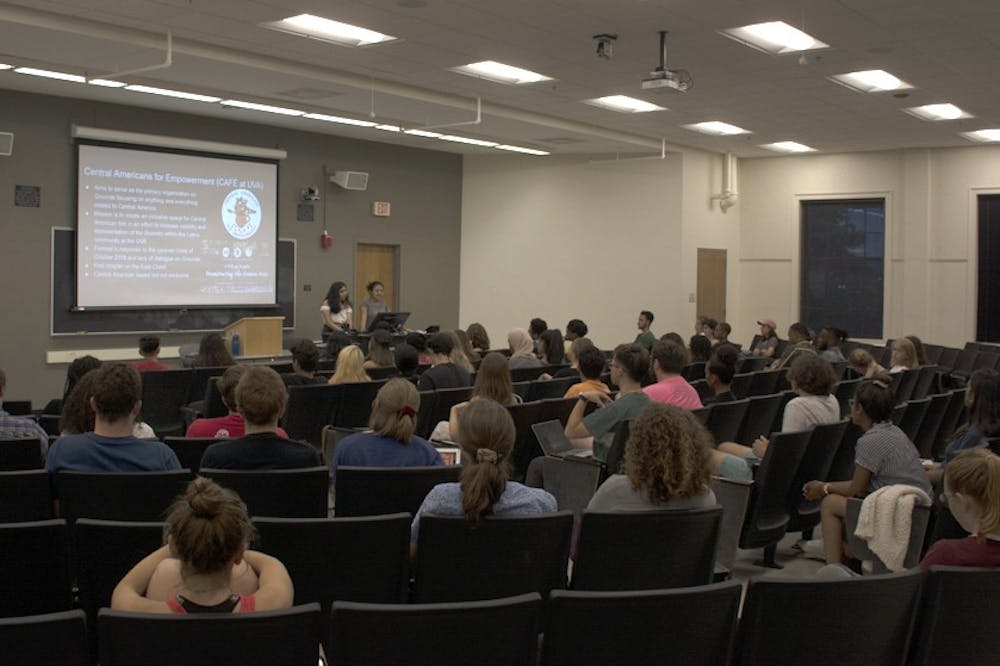More than 75 students and faculty members attended the fourth annual Disorientation event co-hosted by the Living Wage Campaign, Students United, PLUMAS and the University Monday night in Wilson Hall.
The event focused on problems new students face on-Grounds — such as navigating student organizations, understanding how the University functions and how to get involved with student activism. Another focus was creating a more inclusive and accurate experience than the summer orientations incoming first-year students receive by including the history of activism at the University as well as touching upon the history of injustice and institutional racism, according to the organizers.
The event kicked off with an introduction by second-year College student Juan Zazueta, who helped organize the event as a member of U.Va. Students United and PLUMAS.
“This presentation aims to subvert the southern traditionalist culture of the University and of the brutal, unjust legacy but also highlight a radiant history of radical activism that continues today,” Zazueta said.
Fourth-year College student Hannah Russell-Hunter gave a brief history of political activism at the University — including the May 1970 anti-war protests that mobilized over one thousand students to gather on the Lawn following the Kent State shootings. She also mentioned that students constructed shantytowns on the Lawn ahead of the March 1986 Board of Visitors meeting to protest apartheid in South Africa — it was at that meeting that the Board took their first steps towards divesting in apartheid.
The discussion shifted to power structures next, focusing on the Board of Visitors and their role within the University, which, according to their website, is to “serve as the corporate board for the University of Virginia” as well as “approve the policies and budget for the University.” The website for the Board was pulled up and displayed the current members along with their occupations.
“Take note of their occupation and where they’re located,” Russell-Hunter said. “No background of education whatsoever, these are all folks that are coming from the corporate side of things.”
The Board of Visitors is comprised of 17 voting members appointed by the Governor of Virginia. One student member and one faculty member also sit on the Board but neither of them have voting powers. Public comment is not allowed at any of their four yearly meetings in the Rotunda.
“They're all members of a relatively small class of people, which governs the major institutions of society,” Zazueta said, paraphrasing the message of the Radical Student Union from the 1970’s. “So even today not much has really changed, students back then were like raising up the same issues that students today are also raising.”
The discussion then paused to allow attendees to speak with their neighbors about what brought them to the event and anything they have learned and to ask the organizers questions.
Following the intermission student organizations were given the floor to speak about their involvement on grounds and political activism.
The Living Wage Campaign presented first and spoke about their primary goal of providing a living wage for all University employees — whether they are contracted or not. Previously, the LWC rallied outside of the March 2019 Board of Visitors meeting and released a list of demands — one of those being the increase of the minimum wage to $16.84. Now, they have calculated the living wage to be between $18-19 in Charlottesville.
Disorientation also provided a space for minority-affiliated CIOs to speak about their organizations, activism and mission statements — including Political Latinxs United for Movement & Action in Society, the Black Student Alliance, Central Americans for Empowerment, the Afro-Latinx Student Union, DREAMers and Asians Radicalizing Together.
Also present were Students for Peace & Justice in Palestine, VA Student Environmental Coalition, U.Va. Survivors, VA Student Power Network, Student Global AIDS Campaign, Young Democratic Socialists of America, J Street U and Jewish Voice for Peace U.Va.
After the event, Zazueta spoke about the decision to include student organizations and the goal of directly connecting students with activist groups on Grounds.
“It's a unique year,” Zazueta said. “The process was to just take bits and pieces of Disorientation, so like, the political education and then get some student groups, so that was new this year, adding student groups to come so people could get plugged in.”
Following the student organization presentations, first-year Engineering student Oliver Nicholson described his struggle with finding groups to join on Grounds at the Student Council activities fair Aug. 26 and echoed the need for a spotlight to be put on activist groups at the University.
“The student fair thing was set up like,‘Oh, find your club’, but then all the political clubs that also happened to be like the most liberal and disruptive are in this tight packed tent instead of also spread out on the Lawn,” Nicholson said. “They really tried to set us up to not understand this. So yeah, it was very hard. I'm very happy that I'm here.”
Nicholson also spoke about how Disorientation gave him a new perspective on how the University responds to racism and injustice on Grounds.
“Coming here, I realized that it's not doing nearly enough,” Nicholson said. “It’s more trying to put on a facade than actually address all the issues, trying to make the appearance that, ‘Oh, we're all about change,’ when really only doing incremental things.”







